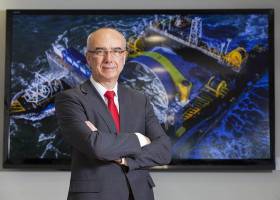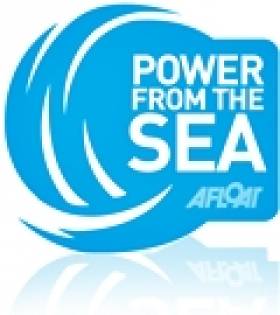Displaying items by tag: OpenHydro
OpenHydro appoints new Chief Executive
OpenHydro, the Irish based tidal energy company and part of DCNS Energies, has appointed Mr Patrick Gougeon as their new Chief Executive Officer. The appointment signals the company’s ongoing drive towards commercialisation of its tidal technology and follows the launch of DCNS Energies, a subsidiary of the DCNS Group which recently secured €100m in investment.
Mr Gougeon joined OpenHydro at the start of January 2017, having previously held the position of CEO of Colibrys, a high-technology industrial company based in Switzerland. He is an engineer from the French Ecole Centrale de Lille and holds an MBA from the HEC School of Management in Paris.
With over twenty years’ experience in delivering global technological projects and transforming organizations in the industrial sector, Mr Gougeon’s senior management career to date has encompassed roles including consultancy in strategy and organisation in McKinsey & Company, as well as change management, international business development, industrial and program management as a successful executive in the Thales and Safran groups.
Thierry Kalaquin, Senior Vice President of Energies at DCNS, said: “We are delighted to be welcoming Patrick to this role, following a successful year in 2016, which saw us deliver significant tidal technology development. We now look forward to moving towards a fully commercial tidal energy solution and servicing our global portfolio of projects.”
Operating out of OpenHydro’s Dublin offices and its Technical Centre in Greenore, Co. Louth, Mr Gougeon heads up a business that has strong plans to expand both locally and internationally.
Commenting on his appointment, Patrick Gougeon said: “I am really looking forward to taking up the challenge to lead OpenHydro’ s team during this exciting phase of its’ evolution. My immediate focus is to ensure that we are well placed for the next stage of growth and opportunities that lie ahead, with the right people, organization, technology and partners in place.”
Irish Firm OpenHydro To Deliver Tidal Energy
James Ives, CEO at tidal energy company OpenHydro will speaking tomorrow at the Ocean Energy Europe Conference being held this week in Croke Park in Dublin. Ives will tell how the Irish marine renewable firm is to be the global leader in tidal solutions, profitably delivering economic marine renewable energy.
The Department of Communications says that €4.5m. will be allocated to ocean energy research in Ireland under Budget provisions next year. Total allocation for energy efficiency and renewable energy onshore and offshore next year is €68m. €9 million is being provided for geoscience initiatives including the INFOMAR and TELLUS programmes, which will support expanded geoscience research in Ireland’s offshore and onshore.
OpenHydro, a DCNS company, based in Ireland, is a technology business that designs and manufactures marine turbines to generate renewable energy from tidal streams. The company's vision is to deploy farms of tidal turbines under the world's oceans - silently and invisibly generating electricity at no cost to the environment. OpenHydro's technology enables the ocean's immense energy to be harnessed for the benefit of all. The electricity produced is completely renewable since it relies on tides that are created by the gravitational effect of the sun and moon. Through this innovative technology, OpenHydro will extract energy from the oceans in an economically viable and environmentally sensitive manner.
OpenHydro has developed the innovative Open-Centre Turbine technology which is a shrouded, horizontal-axis turbine. Simplicity is the key advantage of this technology: manufactured from a small number of components and with only one single moving part (the rotor). There is no need for oils, seals or a gearbox and this not only reduces the requirement for maintenance but ensures reliable performance in the harsh environment that is the World’s oceans. The turbines, each supported on a subsea structure, are placed directly onto the seabed, deep enough so as not to pose a hazard to shipping traffic overhead and the standard OpenHydro product has a diameter of 16m and is rated at 2MW. OpenHydro has also developed a patented method to install the Open-Centre Turbines, allowing all deployments to be completed in a single tidal cycle; less than 6 hours.
OpenHydro is at the fore-front of the tidal industry, with nearly one gigawatt of development in progress across multiple sites in Europe and North America.
OpenHydro Sees Big Future In Channel Islands Tidal Power
#OpenHydro - The Irish Times has a report on OpenHydro's new €600 million deal with a Channel Islands company that's set to establish one of Europe's biggest renewable energy schemes.
Dublin-based hydro-power firm OpenHydro - which earlier this year gave a controlling stake to French naval defence giant DCNS for a €130 million investment - has teamed up with Alderney Renewable Energy to set up a new company called Race Tidal that aims to generate 300MW of power for export to Britain and France.
The project would take advantage of the strong tidal waters off Alderney, the northernmost of the Channel Islands, which OpenHydro CFO Peter Corcoran says have a potential capacity of 3GW.
The long-term project requires obtaining all necessary permits, expected to take four years, followed by two more years of construction and installation of OpenHydro's turbines.
The Irish Times has more on the story HERE.































































